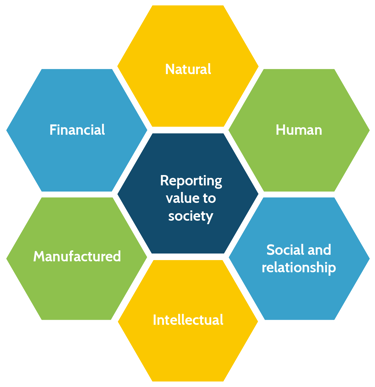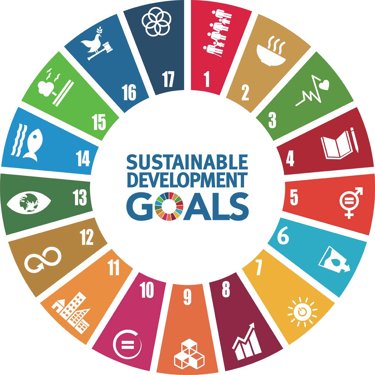The six capitals framework
There is an increasing need for organisations to holistically understand their impacts on and interdependencies with Capitals beyond just Financial. To overcome the limits of traditional financial reporting and to account for wider outcomes, the International Integrated Reporting Commission (IIRC) in 2013 issued the Six Capitals Framework.

The Six Capitals Framework allows a more integrated, realistic and actionable assessment of how value is created over time and allows alignment with the United Nations’ Sustainable Development Goals (SDGs).

The six categories of Capitals also referred to as assets or stocks are as follows:
Natural capital
Natural capital refers to all renewable and non-renewable natural resources (air, water, soil, minerals, plants, animals and biodiversity) that intertwine and combine to provide a range of ecosystem services and in turn benefits to business and society. The quantity, condition and location of natural capitals are key and are impacted by unsustainable resource use, climate change and biodiversity loss.
Human capital
Human capital represents people’s capabilities, competencies and experience in the organisation. This includes research and development initiatives, technological advancements and the expertise of professionals involved. Human capital includes ethical values such as recognition of human rights, loyalties and motivations for service improvement, and people’s ability to lead, manage and collaborate.
Social and relationship capital
Social and relationship capital encompasses the relationship, trust, and shared values between an organisation and its stakeholders, society in general, and other organisations. The significance of responsible and corporate behaviour, ethical practices, and community engagement in building and preserving social capital is highlighted here.
Intellectual capital
Intellectual capital refers to intangible aspects such as patents and intellectual property. It acknowledges the significant role of innovation and research in the long run. The organisation’s future earning potential is tightly linked with this capital, the investments in research and development (R&D), innovation, human resources, and external relationships. Intangibles associated with the brand and reputation that the organisation has developed are also considered intellectual capital.
Manufactured capital
Manufactured capital involves any production-oriented, human-created physical infrastructure and the assets of the organisation. This includes treatment plans, distribution networks, reservoirs, and storage facilities. It is important to note that manufactured capital focuses on the provision of service by any material goods and infrastructure by the organisation rather than becoming embodied in the output itself.
Financial capital
The pool of funds that is available to an organisation for use in the production of goods or the provision of services. Financial capital represents the funds available to an organisation which are obtained through financing. It encompasses cash in the bank, invested capital, liabilities, operational expenditure (OPEX), capital expenditure (CAPEX), true assets value, income, and net book value (NBV). Funds that are generated through operations or investments are also considered as financial capital.
The cascading impacts of the Climate and Ecological Crises and accelerating socio-economic trends requires holistic and therefore accurate accounting as business as usual. There is an irrepressible paradigm shift which is no longer limited to the production of business goods and services but the wider value provided also to society. The Six Capitals Framework acknowledges traditionally overlooked and undervalued resources and assets in the organisation and their upstream-downstream value chain. This will unlock transformative and sustainable outcomes.
Through the Group company Adler and Allan we are experienced in identifying, protecting and enhancing Multi-Capitals. We provide End-to-End Strategic and Operational services to support our clients and communities.
Latest resources
 Insights
InsightsImproving asset-health modelling for a more resilient water sector
 Insights
InsightsOfwat’s approach to asset management maturity
 Insights
InsightsA strategic response to the Storm Overflow Assessment Framework version 2
 Case study
Case studyIndependent assurance verifies robustness of Anglian Water pollution reduction programme
Here to solve your biggest challenges and grow sustainable value
Our expert consultants are available to broaden your thinking, lead transformation, and help you achieve successful outcomes.
Contact our experts

